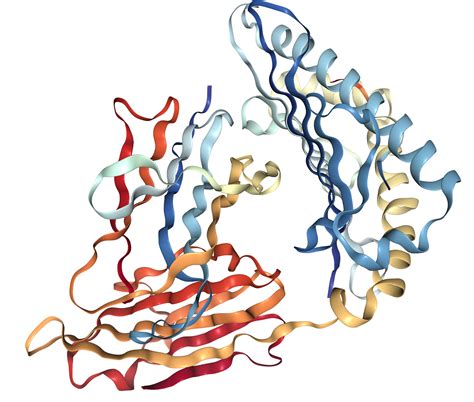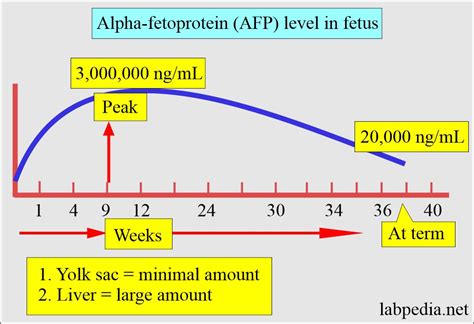Intro
Learn about Serum Alpha Fetoprotein levels, a key biomarker for liver health, fetal development, and cancer screening, including its normal ranges, elevated levels, and related conditions like hepatocellular carcinoma and prenatal testing.
The importance of monitoring serum alpha fetoprotein (AFP) levels cannot be overstated, particularly during pregnancy. Alpha fetoprotein is a protein that is produced by the liver and yolk sac of a fetus, and its levels can provide valuable insights into the health and development of the unborn child. In recent years, the significance of AFP levels has expanded beyond prenatal care, with research exploring its role in various medical conditions, including cancer and liver disease. As a result, understanding the implications of serum alpha fetoprotein levels has become crucial for both expectant mothers and individuals at risk of certain diseases.
The measurement of AFP levels is a common practice in prenatal care, as it can help identify potential fetal abnormalities. Elevated or decreased levels of AFP in the mother's blood can indicate the presence of certain conditions, such as neural tube defects or Down syndrome. Furthermore, monitoring AFP levels over time can provide healthcare providers with a more comprehensive understanding of fetal development and help identify any potential complications early on. This information can be invaluable in ensuring the best possible outcomes for both mother and child.
In addition to its role in prenatal care, research has also explored the relationship between serum alpha fetoprotein levels and various medical conditions. For instance, elevated AFP levels have been linked to certain types of cancer, including liver and testicular cancer. Moreover, AFP levels have been shown to be a useful marker for monitoring liver health, with abnormal levels potentially indicating liver damage or disease. As a result, understanding the significance of serum alpha fetoprotein levels has become essential for healthcare providers and individuals alike, as it can provide critical insights into overall health and well-being.
Introduction to Alpha Fetoprotein

Functions of Alpha Fetoprotein
The functions of alpha fetoprotein are not yet fully understood, but research has identified several potential roles. These include: * Binding and transport of various substances, such as bilirubin and fatty acids * Regulation of immune responses and inflammation * Maintenance of fetal development and growth * Potential role in the development of certain diseases, such as cancer and liver diseaseMeasurement of Alpha Fetoprotein Levels

Interpretation of Alpha Fetoprotein Levels
The interpretation of alpha fetoprotein levels depends on various factors, including gestational age and individual characteristics. In general, AFP levels are considered abnormal if they fall outside of the following ranges: * 10-40 ng/mL during the first trimester * 10-150 ng/mL during the second trimester * 10-100 ng/mL during the third trimesterAlpha Fetoprotein and Prenatal Care

Alpha Fetoprotein and Fetal Development
Research has shown that alpha fetoprotein plays a critical role in fetal development, particularly during the first trimester. Abnormal AFP levels have been linked to various fetal abnormalities, including: * Congenital heart defects * Cleft palate * OmphaloceleAlpha Fetoprotein and Cancer

Alpha Fetoprotein as a Tumor Marker
Alpha fetoprotein can be used as a tumor marker to monitor the progression of certain types of cancer. Elevated AFP levels can indicate the presence of cancer, while decreased levels can indicate a positive response to treatment.Alpha Fetoprotein and Liver Disease

Alpha Fetoprotein and Liver Function
Research has shown that alpha fetoprotein can be used to monitor liver function and detect potential liver damage. Elevated AFP levels can indicate liver inflammation or damage, while decreased levels can indicate liver dysfunction.What is alpha fetoprotein?
+Alpha fetoprotein is a protein produced by the liver and yolk sac of a fetus during pregnancy. It plays a critical role in fetal development and can be used to monitor fetal health and detect potential complications.
What are the functions of alpha fetoprotein?
+The functions of alpha fetoprotein are not yet fully understood, but research has identified several potential roles, including binding and transport of various substances, regulation of immune responses and inflammation, and maintenance of fetal development and growth.
What are the implications of abnormal alpha fetoprotein levels?
+Abnormal alpha fetoprotein levels can indicate the presence of certain fetal abnormalities, such as neural tube defects or Down syndrome. Elevated AFP levels have also been linked to certain types of cancer and liver disease.
In conclusion, understanding the significance of serum alpha fetoprotein levels is crucial for both expectant mothers and individuals at risk of certain diseases. By monitoring AFP levels, healthcare providers can gain valuable insights into fetal development and detect potential complications early on. Additionally, research has shown that alpha fetoprotein can be used as a tumor marker to monitor the progression of certain types of cancer and detect liver damage or disease. As research continues to explore the role of alpha fetoprotein in human health, it is essential to stay informed and up-to-date on the latest developments. We invite you to share your thoughts and questions in the comments below and to explore other resources on this topic.
